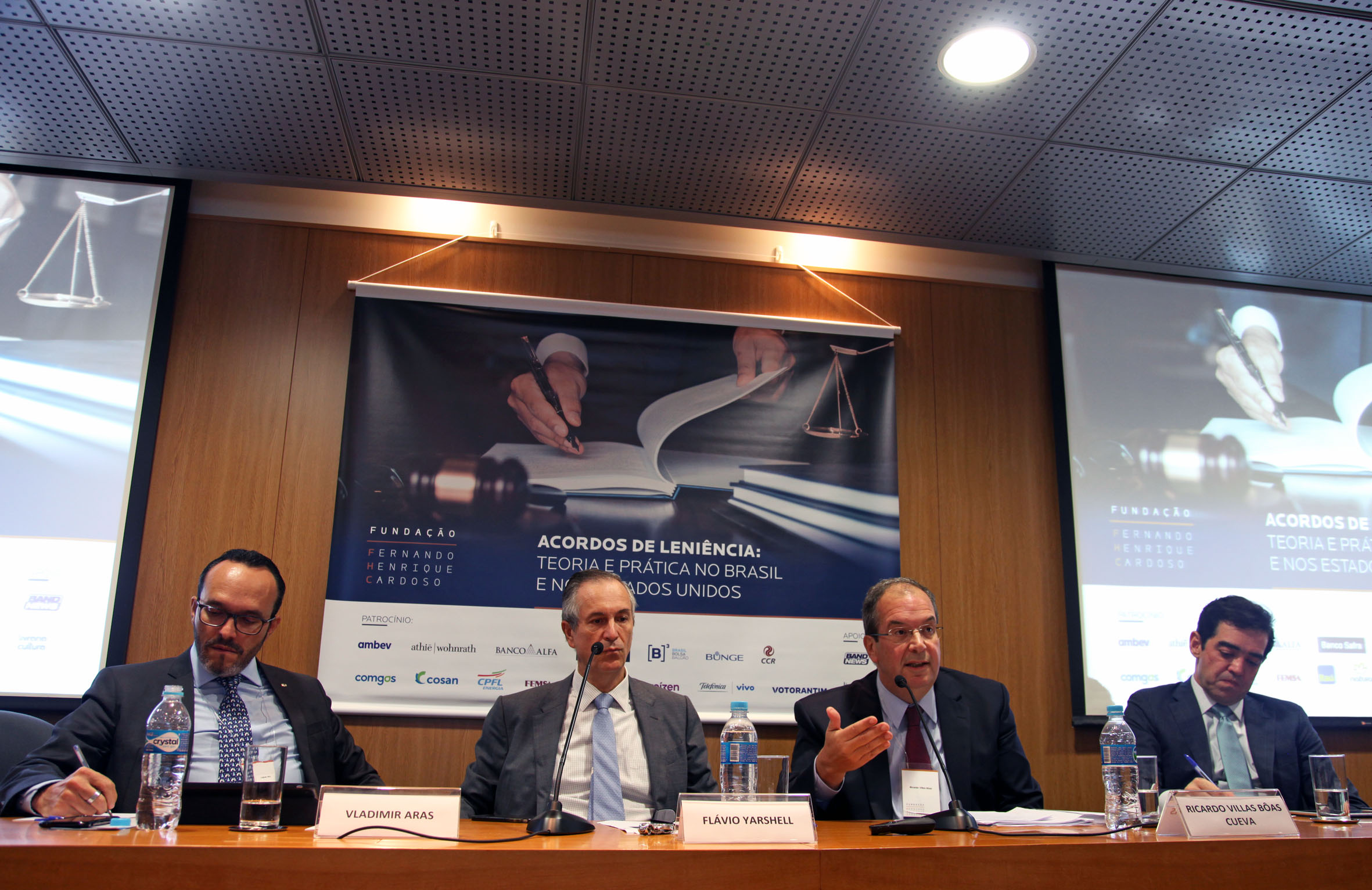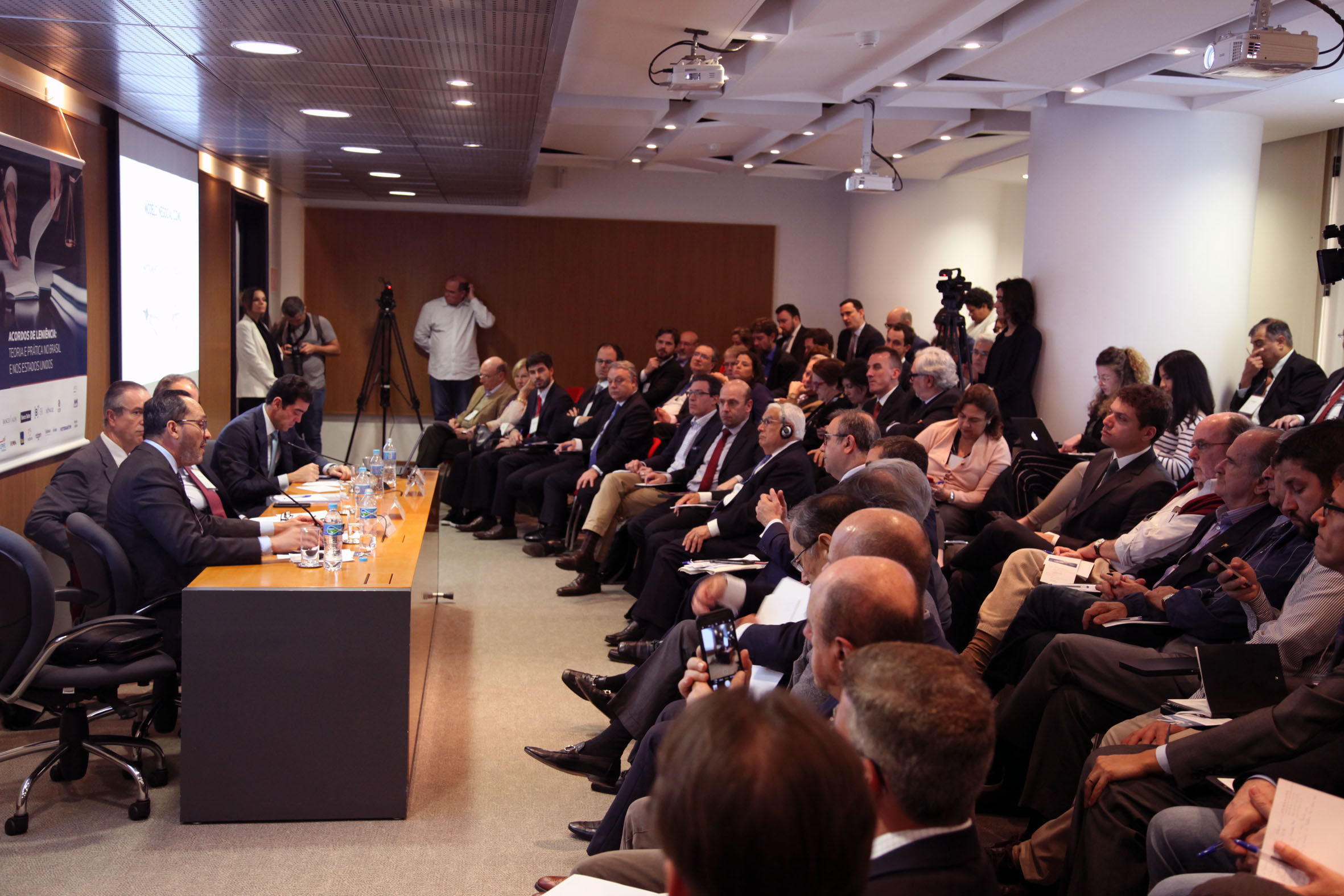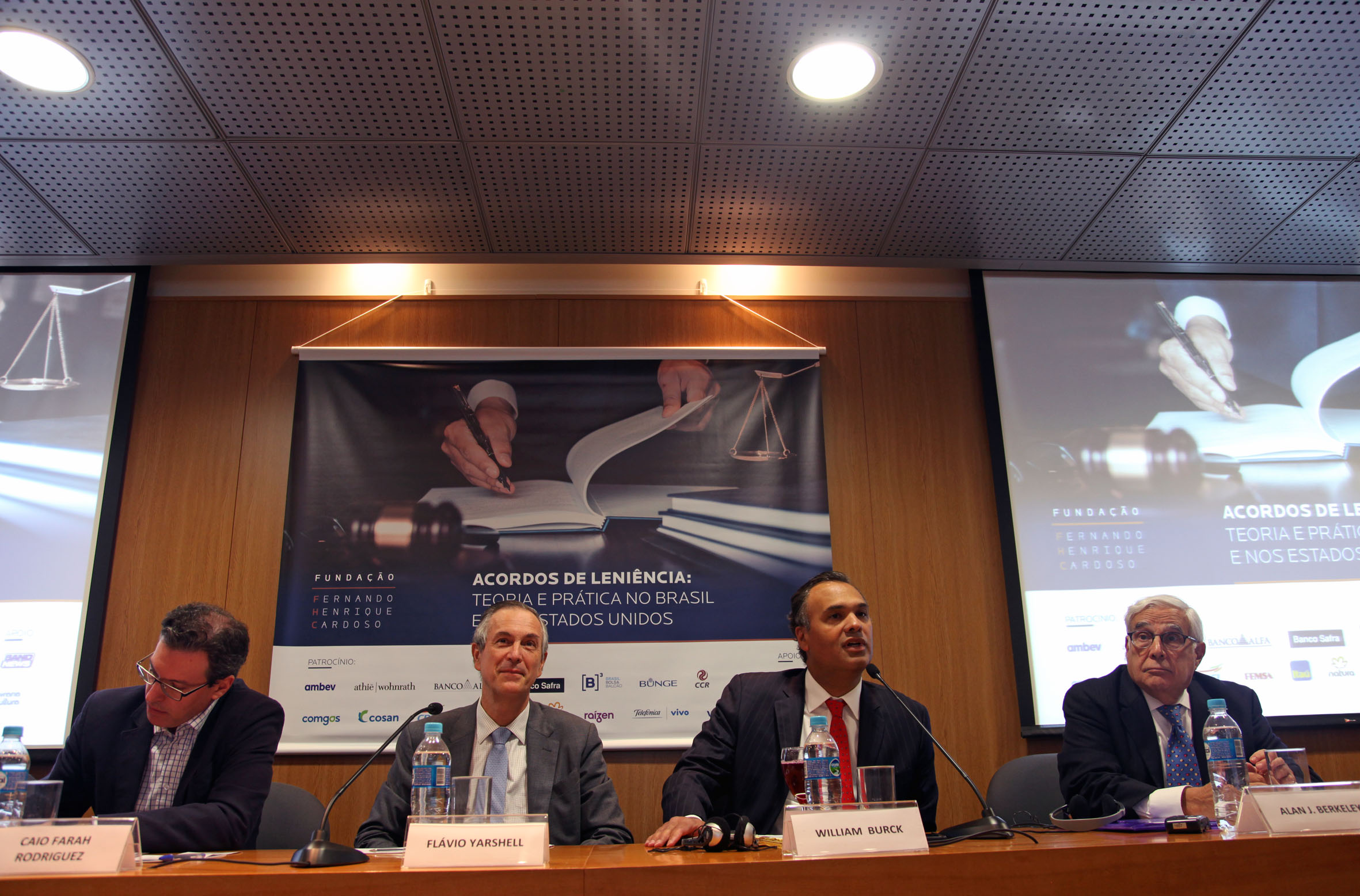Leniency agreements: theory and practice in Brazil and in the United States
“The main characteristic of agreements negotiated between the North American Department of Justice and companies involved in frauds is flexibility.”
William Burck, lawyer and former federal prosecutor in New York
“In Brazil, the MPF (Federal Attorney’s Office), AGU (Solicitor General), CGU (Government Accountability Office) and TCU (General Accounting Office) dispute on who has the biggest stick. It is indispensable that the system should converge towards a type of one-stop shop or institutional umbrella.”
Ricardo Villas Bôas Cueva, minister of Superior Tribunal of Justice (STJ)
“Institutional multiplicity occurs in many countries. If we had a single centralized body responsible for combating corruption, would the Lava Jato (Car Wash) operation have happened?”
Caio Farah Rodriguez, lawyer and professor at FGV Law Rio
“We are learning how to deal with a whole new flood of rules in a case that is huge in size, Car Wash. Sometimes things happen in Brazil to test whether God is Brazilian. I hope he is.”
Bruno Dantas Nascimento, TCU (General Accounting Office) minister
“Part of society rejects models based on negotiation such as plea bargaining and leniency agreements because they think they end up benefiting criminals. It is important to overcome this prejudice in order to consolidate these tools.”
Vladimir Aras, regional federal prosecutor (MPF) in Brasilia
“In the USA, more than 90% of the Securities and Exchange Commission’s (SEC) enforcement procedures are resolved with agreements between the parties. The main reason is that the federal agency does not have the budget, staff and other resources to investigate all the cases by itself.”
Alan Berkeley, attorney specialized in corporate transactions and legal questions involving securities
While in Brazil leniency agreements are a novelty and still cause conflict between various state bodies involved in combating corruption and other crimes and illegal activities, in the United States, consensual means of conflict resolution are the main instrument for settling suits and controversies, with broad freedom of action for the parties involved in the negotiation.
This was the main conclusion reached in this seminar, in which the first panel comprised diverse Brazilian state authorities and the second, two US lawyers and one Brazilian lawyer. “In December 2017, here in the Fundação FHC we organized a seminar on acordos de colaboração premiada, ‘plea bargaining’, which was also based on a comparative perspective between Brazil and the USA. Today we will examine leniency agreements, which are not only important for criminalists, but also involve a number of other professional. What lessons may be learned from the North American experience, and what directions have we been following in this area?”, asked Flávio Yarshell, an attorney active in the consulting and litigation areas (judicial and arbitration) and the mediator of the event.

Success story
Ricardo Villas Bôas Cueva (Superior Tribunal of Justice) commented that the anti-trust authority CADE (Conselho Administrativo de Defesa Econômica) has been making agreements with companies since the beginning of the 2000s. “It has been a success, with some 90 agreements reached. In 2013, the Anti-corruption Law enabled the possibility of leniency agreements in the Brazilian legal system inspired by the American model”, said the ex-member of that federal body, whose attributions include defending fair competition.
The minister stressed that the importation of this tool was not immune to criticism, because the Brazilian legal tradition is inquisitorial, in which the State is obliged to take legal action, differently from the USA (further details ahead). “We are used to a vertical relationship between the State and the citizen (and companies), in opposition to cooperation, while these negotiating instruments propose a more horizontal relationship that is open to cooperation and mutual concessions”, he explained.
Cueva listed some of the challenges involved in consolidating leniency agreements in the country:
- Competency to negotiate
“The Anti-Corruption Law (nº 12.846/2013) opted for a competitive system among the authorities with the competence to impose punishment. Some specialists see this as something positive in the fight against the systemic corruption that takes over the country. Others see this overlap as a contest between executioners.” - Clearer parameters for negotiating and approving agreements
“With this goal, in 2017 the Federal Attorney released Guidance nº 07, aimed at organizing the always complex negotiations involved in leniency agreements.” - Criteria for the benefits on offer
“Clearer parameters are necessary to define the sentences and the pecuniary contributions, thus ensuring a certain consistency in similar situations.” - Conditions and time limits for the maintenance of confidentiality
“The fact is that leaks are pernicious because they put the principle of confidentiality, essential in persuading potential future collaborators to cooperate, at risk. But facts and documents cannot remain confidential indefinitely at the risk of not exercising another important public interest, which is civil prosecution to redress the damage caused.” - Definition of hypotheses for the rescission of already approved agreements.
Institutional architecture
Bruno Dantas Nascimento (TCU) underscored that the multiplicity of authorities empowered to combat corruption was established in the 1988 Constitution, which has just commemorated 30 years of existence. “In Brazilian institutional architecture, three of the four institutions that are key in fighting corruption — MP (Federal Attorney’s Office), the TCU (General Accounting Office) and the AGU (Solicitor General) — have different constitutional missions, that may not be changed by ordinary law. Whereas the Anti-corruption law designated the Comptroller General to negotiate and establish leniency agreements. Does this mean that the MP, TCU and AGU are automatically removed from the process? No, because an ordinary law may not detract from a constitutional competency”, the judge said.
Dantas also pointed out that the same act of corruption may be viewed from a penal, fiscal, competitive, civil and administrative perspective, depending on the authority involved and the scope of its interest. “Regarding the TCU, a key function is the pursuit of the full reparation of funds embezzled from public coffers. To this end, the court has more than 2,000 qualified auditors who are not subject even to us judges. The governance of the General Accounting Office (TCU) is so compartmentalized and robust that in no way could the wishes of just one person prevail”, he explained.

Dantas also said that in the Car Wash operation, the TCU only analyzes the legality and the economic aspects of the leniency agreements. “It does not negotiate, make or approve agreements. What is debated is whether the TCU analysis should precede or follow the agreement. Both alternatives have advantages and disadvantages. If the analysis is prior and the agreement is settled, it will provide greater legal security. On the other hand, the larger the number of parties involved, the more difficult the negotiation will be. Speaking for the court, I can say that there is no intention to create obstacles, but rather to guarantee the security (of the leniency agreements)”, he said.
As an example he cited the biggest ever leniency agreement reached in Brazil, with the Odebrecht Group, involving fines amounting to R$ 7 billion. “However, the TCU calculates losses of over R$20 billion to the public coffers. Therefore, there is a significant shortfall involved. On the other hand, would it be possible to remedy all the damages? Shortly we will have to set up a back tax payment scheme for the leniency agreements”, he joked. Dantas proposed that the full repayment, at times unrealistic, should be substituted by penalties such as mandatory transfer of control of the company. “In the United States, the people responsible for frauds are forced relinquish control of the company”, he said.
Synergy
Vladimir Aras (MPF) advocated that the different institutional missions of the diverse anti-corruption bodies, which at times overlap, should be resolved by the Legislature. “We do in fact have a complex situation involving multiple competencies, and the institutions need to be coordinated. The cooperation between the public prosecution service, the federal police, the comptroller general, the tax authorities and CADE in the Car Wash operation is a good example. The National Congress should also contribute by providing clearer legislation”, he stated.
Furthermore, the prosecutor proposed that the MPF should seek greater synergy between the civil and penal dimensions of the same suit. “Leniency is a negotiated legal instrument which has a criminal side and a non-criminal one. The MP is equally interested in both perspectives. Criminal proof leverages civil proof and vice-versa”, he said.
Aras, who was secretary of International Judicial Cooperation for the Brazilian Attorney General between 2013 and 2017, with responsibility for coordinating transnational criminal prosecutions for the MPF in a number of prominent cases, including Car Wash, also suggested that Brazil should enhance the mechanisms of negotiated justice in line with the Mérida (Anti-corruption) and Palermo (Anti-Transnational Organized Crime) Conventions, both under the ambit of the United Nations, as well as with countries more accustomed to using these instruments.
Flexibility
In the second panel, the North American attorney William ‘Bill’ Burck, managing partner of the legal firm Quinn Emanuel Urquhart & Sullivan, LLP, in Washington D.C., gave a succinct explanation of how leniency agreements work in his country. “There is a great deal of flexibility, there are not too many legal requirements restricting what may or may not be done”, he stated.
Upon negotiating an agreement with the Department of Justice (DOJ), equivalent to the Ministério Público Federal in Brazil, the priority for companies is to avoid a guilty plea. “When a company admits to criminal conduct, the legal and financial consequences are very serious. In some cases, it can ruin a company in the markets it operates in”, he said. This is what happened to Arthur Andersen, which was one of the top five accounting firms in the USA before it was condemned for obstruction of justice in the Enron case at the beginning of the 2000s. Years later, the condemnation was reversed in the Supreme Court, but the company never managed to regain its former position.

The best scenario is when the DOJ offers to not bring a law suit immediately and determines that the company may avoid prosecution on the condition that it cooperates with the Justice Department, reviews its practices and behaves itself for the period of time established in the agreement. This is what is called a “deferred prosecution agreement”.
“In all cases, the possibility of a financial penalty exists”, Bill explained. Leniency agreements generally occur when the Department of Justice becomes aware of some illegal activity or when the company itself reports misconduct to the federal government. “Generally, the DOJ gives the company the opportunity to investigate itself”, he said.
The investigation, conducted by specially contracted lawyers who have no previous dealings with the company, may take months or years. During the process, the company hands over documents (such as emails), presents interim reports and, at the end, a conclusive report. “When the investigation is over, the lawyers and the federal agents negotiate an agreement. The most important point is to understand the agents’ main motivation: they could be interested in getting information about other people involved, imposing a heavy fine or ensuring favorable media coverage. As a lawyer in the USA, it is important to have a good understanding of what the State really wants in each case and, based on this understanding, propose the most suitable solution for one’s client. You can even be creative”, Bill Burck joked.
Economy of resources
Next, his colleague Alan Berkeley, considered to be one of the top lawyers in corporate law in the United States, talked about his extensive experience in the Securities and Exchange Commission (SEC, equivalent to Brazil’s Comissão de Valores Mobiliários or CVM). “The SEC took the possibility of self reporting to a very high level. And more than 90% of the cases of misconduct in the stock, securities and financial markets are resolved with agreements”, he said.
The main incentive for cooperation on the part of the companies is to avoid a long, damaging investigation process that could result in the company being forced out of the market, as well as to obtain a lower fine. “From the government’s standpoint, this avoids the need to commit limited financial and human resources and, in parallel, improves its case resolution statistics”, he concluded.
‘Question of power’
The Brazilian lawyer Caio Farah Rodriguez, associate in the Escritório Barros Pimentel Advogados legal firm, who was recently involved in negotiating Odebrecht’s global leniency agreement, initiated his talk with a controversial declaration. “Speaking in a clear Portuguese, the main questions that affect leniency agreements in Brazil are false problems, it is more a question of power”, he said.
For Caio Farah, the multiplicity of institutions — “a nice way of describing the mess we have here” — has been benign in its investigations of corruption, in particular the Car Wash. “There has been abuse along the way on the part of one institution/authority or another, but gradually we are seeing a benign harmonization process without the need to change the law or the Constitution. An example of this is the emergence of a rational and independent bureaucracy in the AGU and the TCU, with the creation of protective shields against political influences”, he stated.
According to the lawyer, the leniency agreements negotiated in the wake of the Car Wash operation “had the merit of imposing a jolt of capitalism on the capitalists”. After the revelation of cartel practices by some of the largest construction companies in the country in collusion with politicians from all the parties, “some of these companies have made leniency agreements under conditions that put them in an unfavorable situation in their market”, he explained.
“Previously, the compliance policies of these oligopolies were just for show. With the leniency agreements, they are being transformed into drivers of transformation in order for the companies to survive. If this is not worth celebrating, I don’t know what is”, he concluded.
Otávio Dias, journalist, is specialized in politics and international affairs. He was the correspondent for the Folha in London, editor of the estadão.com.br website and chief editor of the Huffington Post in Brazil.
Translated by Raymond Maddock. Revised by Beatriz Kipnis.




